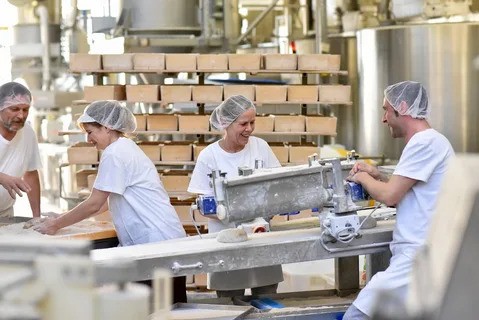Canada Factory Worker Jobs
Factory worker jobs form a vital part of Canada’s labor market and industrial economy. The manufacturing sector in Canada, which includes industries such as automotive, food processing, textiles, and electronics, relies heavily on factory workers to keep production running smoothly. These jobs are essential in producing goods that contribute to both domestic consumption and international exports, making factory work one of the backbones of the Canadian economy.
Despite the growing interest in high-tech and service sector jobs, factory worker positions continue to attract many individuals due to their stability, decent pay, and the opportunity to work in a wide range of industries. In this article, we’ll explore the different types of factory worker jobs available in Canada, the skills required for these roles, the challenges faced by factory workers, and the future prospects for manufacturing jobs in Canada.
The Role of Factory Workers in Canada’s Economy
Factory workers in Canada are employed across a range of sectors, including automotive manufacturing, food production, aerospace, electronics, and chemicals. According to Statistics Canada, manufacturing remains one of the country’s largest employers, employing over 1.7 million people as of 2023. This sector contributes significantly to the country’s GDP, and despite economic fluctuations, factory jobs remain a stable source of employment for many Canadians and foreign workers alike.
Types of Factory Worker Jobs
Factory work in Canada can vary greatly depending on the industry, the size of the company, and the level of automation used in production. Some of the most common types of factory jobs include:
1. Production Line Workers
Production line workers are at the heart of many manufacturing processes. Their primary role is to assemble products or parts in a sequential manner, often in an assembly line format. These jobs are common in the automotive, electronics, and food processing industries.
- Tasks: Assembly of products, quality control, packaging, and operating machinery.
- Skills required: Attention to detail, physical stamina, ability to follow procedures, and basic technical skills.
2. Machine Operators
Machine operators are responsible for operating, monitoring, and maintaining machinery used in the production process. These machines may include presses, conveyor belts, cutting machines, or robots, depending on the factory’s specialization. Machine operators play a critical role in ensuring production lines run smoothly and efficiently.
- Tasks: Operating machines, troubleshooting issues, performing routine maintenance, and ensuring products meet quality standards.
- Skills required: Technical knowledge of machines, mechanical aptitude, problem-solving abilities, and precision.
3. Forklift Operators
Forklift operators are essential in factories for moving raw materials, finished products, and other goods around the factory floor or warehouse. In industries such as food processing, automotive, and construction materials, forklift operators help to ensure that materials are readily available for production and that finished goods are efficiently stored or loaded for transport.
- Tasks: Loading and unloading materials, transporting goods within the factory, and organizing storage areas.
- Skills required: Forklift certification, good spatial awareness, and the ability to operate heavy machinery safely.
4. Quality Control Inspectors
Quality control (QC) inspectors ensure that products meet the company’s quality standards before they are shipped to customers. QC inspectors examine products, perform tests, and report any defects or discrepancies in production. This role is crucial for maintaining the integrity of the company’s products, particularly in industries such as aerospace, automotive, and food processing, where safety and quality are of paramount importance.
- Tasks: Inspecting products, conducting tests, documenting findings, and recommending corrective actions.
- Skills required: Attention to detail, knowledge of industry standards, problem-solving, and analytical skills.
5. Warehouse Workers
Many factories have associated warehouses where raw materials and finished products are stored. Warehouse workers are responsible for managing inventory, preparing shipments, and maintaining a clean and organized storage space. In some cases, warehouse workers may also handle the packaging and labeling of products before they are shipped to customers.
- Tasks: Organizing inventory, preparing orders for shipment, and ensuring safe storage of goods.
- Skills required: Organizational skills, attention to detail, basic math skills, and physical stamina.
Skills and Qualifications Required for Factory Worker Jobs
While some factory worker jobs in Canada require specialized skills or technical expertise, many entry-level positions do not require formal education beyond a high school diploma. However, certain skills and qualifications can enhance a worker’s employability and job performance:
- Technical Skills: Familiarity with machinery, tools, and technology is often required in roles such as machine operators or maintenance technicians. Some factories may provide on-the-job training, but prior experience with certain equipment can be an advantage.
- Physical Stamina: Factory work is often physically demanding, requiring workers to stand for long periods, lift heavy objects, and perform repetitive tasks. Physical stamina and good health are important for many factory jobs.
- Attention to Detail: Whether you are working on an assembly line or inspecting products for defects, attention to detail is crucial to ensuring products meet quality standards and avoiding errors in the production process.
- Teamwork: Factory work typically involves collaborating with other workers to complete tasks efficiently. Strong communication skills and the ability to work well in a team are essential in most factory jobs.
In addition to these skills, many factories require employees to follow strict safety protocols, particularly in industries where machinery or hazardous materials are involved. As such, having a good understanding of workplace safety regulations is essential for anyone considering a factory worker job.
Opportunities for Foreign Workers in Canadian Factories
Canada is known for being a welcoming country for immigrants, and the demand for factory workers has opened up opportunities for foreign laborers, particularly in industries facing labor shortages. Canada has several work permit programs that allow foreign workers to fill factory jobs, such as the Temporary Foreign Worker Program (TFWP), which enables employers to hire foreign workers to meet their labor needs when qualified Canadian citizens are not available.
The Atlantic Immigration Pilot Program and other provincial nomination programs (PNPs) also facilitate the hiring of foreign workers in specific regions where the need for labor is high. These programs have made it easier for immigrants to secure factory jobs, particularly in rural areas where factories are key employers but struggle to attract a local workforce.
Additionally, foreign workers may find it easier to get permanent residency through Canada’s immigration programs, especially if they have work experience in high-demand industries such as manufacturing.
Challenges Faced by Factory Workers
While factory jobs can provide stable employment, they also come with challenges that workers must navigate. Some of the most common challenges include:
1. Physical Demands and Repetitive Work
Factory work can be physically taxing, with employees required to stand for long periods, lift heavy objects, and perform repetitive tasks. Over time, this can lead to physical strain or injury, particularly if workers are not careful to follow proper ergonomic practices.
2. Workplace Safety Concerns
Factory environments, particularly those that involve heavy machinery or hazardous materials, can present safety risks to workers. While Canada has strict workplace safety regulations, accidents can still occur if safety protocols are not followed. Workers must be vigilant and adhere to safety guidelines to prevent injuries.
3. Monotonous Tasks
Many factory jobs involve performing the same task repeatedly, which can lead to boredom or burnout for some workers. While automation is increasingly being used to reduce the monotony of certain tasks, many factories still rely on manual labor for assembly and production processes.
4. Shift Work and Irregular Hours
Factory jobs often require workers to work in shifts, including nights, weekends, and holidays. While shift work allows factories to operate 24/7, it can disrupt workers’ personal lives and make it difficult to maintain a healthy work-life balance.
The Future of Factory Jobs in Canada
The future of factory worker jobs in Canada is shaped by several factors, including automation, globalization, and government policies aimed at supporting the manufacturing sector.
1. Automation and Technological Advancements
Automation and robotics are transforming the factory floor, with machines taking over repetitive tasks and improving efficiency. While this has led to concerns about job displacement, automation is also creating new opportunities for workers with technical skills. Factory workers who can operate, maintain, and troubleshoot automated machinery are in high demand.
2. Reshoring of Manufacturing Jobs
In recent years, there has been a growing trend toward reshoring manufacturing jobs, with companies bringing production back to Canada from overseas. This shift has been driven by factors such as rising labor costs in other countries, supply chain disruptions, and the desire to produce goods closer to the end consumer. Reshoring has the potential to create new factory jobs in Canada, particularly in industries such as electronics, automotive, and textiles.
3. Government Support for Manufacturing
The Canadian government has introduced various initiatives to support the manufacturing sector, particularly in light of the COVID-19 pandemic. For example, programs such as the Strategic Innovation Fund provide financial support to manufacturers looking to innovate and expand their operations. These initiatives are expected to create more factory jobs and support the long-term growth of the manufacturing sector.
Canada Factory Worker Jobs
Factory worker jobs in Canada offer a wide range of employment opportunities across different industries, providing stable, well-paying jobs for both Canadian citizens and foreign workers. While the work can be physically demanding and repetitive, factory jobs are crucial to Canada’s economy and provide a path for career advancement, particularly in skilled positions such as machine operators or quality control inspectors.
As the manufacturing sector continues to evolve, with increasing automation and technological advancements, factory workers will need to adapt to new technologies and develop specialized skills to stay competitive in the job market. However, the future of factory work in Canada looks promising, with new job opportunities emerging as companies invest in reshoring production and expanding manufacturing capabilities.
Overall, factory jobs in Canada offer a solid foundation for workers seeking stable employment, with opportunities for growth in both technical and managerial roles.



